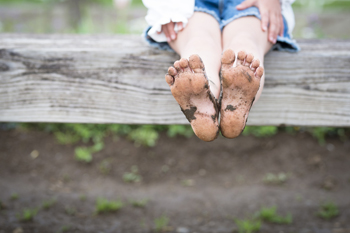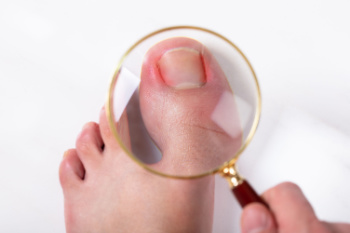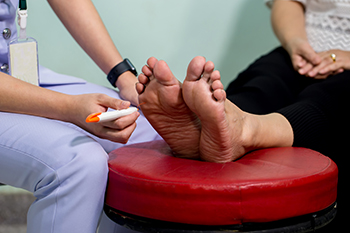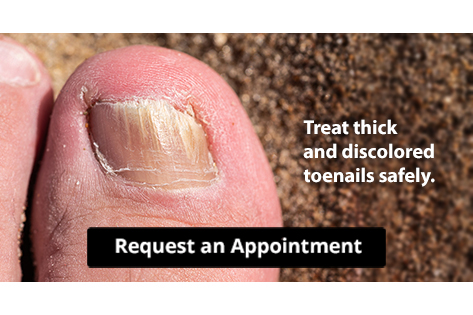Items filtered by date: March 2024
Children’s Growing Pains or Serious Foot Concern?
 Growing pains are a normal part of development in childhood. Children may experience mild aches or discomfort in the legs and feet due to the rapid growth phases they go through. Typically, these pains occur at night and don’t continue into the following day. However, when children’s foot pain deviates from these patterns, such as being localized, persistent, or severe, it may indicate a more profound issue. For instance, pain that worsens with activity could suggest Sever's disease, an inflammation of the heel's growth plate. Swelling, redness, or tenderness could point towards juvenile idiopathic arthritis. Something else may be amiss if there is a noticeable change in a child’s gait, like limping or reluctance to engage in previously enjoyed activities. If you’re unsure about whether your child is experiencing normal growing pains or something more, it is time for a visit with a foot doctor, otherwise known as a podiatrist. This type of doctor can diagnose any issues, and offer appropriate care and intervention to ensure the best foot health for your child.
Growing pains are a normal part of development in childhood. Children may experience mild aches or discomfort in the legs and feet due to the rapid growth phases they go through. Typically, these pains occur at night and don’t continue into the following day. However, when children’s foot pain deviates from these patterns, such as being localized, persistent, or severe, it may indicate a more profound issue. For instance, pain that worsens with activity could suggest Sever's disease, an inflammation of the heel's growth plate. Swelling, redness, or tenderness could point towards juvenile idiopathic arthritis. Something else may be amiss if there is a noticeable change in a child’s gait, like limping or reluctance to engage in previously enjoyed activities. If you’re unsure about whether your child is experiencing normal growing pains or something more, it is time for a visit with a foot doctor, otherwise known as a podiatrist. This type of doctor can diagnose any issues, and offer appropriate care and intervention to ensure the best foot health for your child.
Making sure that your children maintain good foot health is very important as they grow. If you have any questions, contact Darline Kulhan, DPM of Scarsdale Foot Specialists PC. Our doctor can provide the care you need to keep you pain-free and on your feet.
Keeping Children's Feet Healthy
Having healthy feet during childhood can help prevent medical problems later in life, namely in the back and legs. As children grow, their feet require different types of care. Here are some things to consider...
Although babies do not walk yet, it is still very important to take care of their feet.
Avoid putting tight shoes or socks on his or her feet.
Allow the baby to stretch and kick his or her feet to feel comfortable.
As a toddler, kids are now on the move and begin to develop differently. At this age, toddlers are getting a feel for walking, so don’t be alarmed if your toddler is unsteady or ‘walks funny’.
As your child gets older, it is important to teach them how to take care of their feet.
Show them proper hygiene to prevent infections such as fungus.
Be watchful for any pain or injury.
Have all injuries checked by a doctor as soon as possible.
Comfortable, protective shoes should always be worn, especially at play.
If you have any questions please feel free to contact our office located in Scarsdale, NY . We offer the newest diagnostic and treatment technologies for all your foot and ankle needs.
Stop Your Toenail Fungus
Causes and Treatment for Ingrown Toenails

Ingrown toenails can turn simple movements into a painful experience and even lead to infections if left untreated. Ingrown toenails develop when a toenail grows into the surrounding skin, particularly prevalent in the big toe. Factors like wearing ill-fitting footwear, genetics, improper nail trimming, or trauma are common causes of ingrown toenails. Symptoms can include pain, swelling, and redness around the affected nail. Prevention involves wearing properly fitted shoes with roomy toe boxes, trimming nails straight across, and avoiding tight socks. For help in managing severe, infected, or recurring ingrown toenails, treatment from a podiatrist is suggested. This foot doctor can prescribe antibiotics for infections or surgical removal of the toenail, if necessary. A podiatrist can also recommend methods to avoid ingrown toenails in the future. It is suggested that you schedule an appointment with a podiatrist at the first sign of an ingrown toenail.
Ingrown toenails can become painful if they are not treated properly. For more information about ingrown toenails, contact Darline Kulhan, DPM of Scarsdale Foot Specialists PC. Our doctor can provide the care you need to keep you pain-free and on your feet.
Ingrown Toenails
Ingrown toenails occur when a toenail grows sideways into the bed of the nail, causing pain, swelling, and possibly infection.
Causes
- Bacterial infections
- Improper nail cutting such as cutting it too short or not straight across
- Trauma to the toe, such as stubbing, which causes the nail to grow back irregularly
- Ill-fitting shoes that bunch the toes too close together
- Genetic predisposition
Prevention
Because ingrown toenails are not something found outside of shoe-wearing cultures, going barefoot as often as possible will decrease the likeliness of developing ingrown toenails. Wearing proper fitting shoes and using proper cutting techniques will also help decrease your risk of developing ingrown toenails.
Treatment
Ingrown toenails are a very treatable foot condition. In minor cases, soaking the affected area in salt or antibacterial soaps will not only help with the ingrown nail itself, but also help prevent any infections from occurring. In more severe cases, surgery is an option. In either case, speaking to your podiatrist about this condition will help you get a better understanding of specific treatment options that are right for you.
If you have any questions please feel free to contact our office located in Scarsdale, NY . We offer the newest diagnostic and treatment technologies for all your foot and ankle needs.
How Diabetes Affects the Feet

Living with diabetes brings a multitude of challenges, with one often overlooked aspect being the health of your feet. Diabetes can lead to significant complications in foot health, including ulcers, nerve damage, and infections. Uncontrolled diabetes can cause nerve damage, resulting in reduced sensation in the feet, which is a condition known as diabetic neuropathy. This loss of feeling can indicate that minor injuries or irritations may go unnoticed, and increases the likelihood of them turning into more severe problems like ulcers. Additionally, diabetes can damage the arteries supplying the nerves, furthering nerve damage and impairing circulation. Regular foot checks by a podiatrist are essential for individuals with diabetes. These visits will monitor foot health, identify early signs of complications, and guidance will be received on proper foot care techniques. If you have foot problems that may be the result of diabetes, it is suggested that you schedule regular visits to a podiatrist who is medically trained to manage this condition.
Diabetic foot care is important in preventing foot ailments such as ulcers. If you are suffering from diabetes or have any other concerns about your feet, contact Darline Kulhan, DPM from Scarsdale Foot Specialists PC. Our doctor can provide the care you need to keep you pain-free and on your feet.
Diabetic Foot Care
Diabetes affects millions of people every year. The condition can damage blood vessels in many parts of the body, especially the feet. Because of this, taking care of your feet is essential if you have diabetes, and having a podiatrist help monitor your foot health is highly recommended.
The Importance of Caring for Your Feet
- Routinely inspect your feet for bruises or sores.
- Wear socks that fit your feet comfortably.
- Wear comfortable shoes that provide adequate support.
Patients with diabetes should have their doctor monitor their blood levels, as blood sugar levels play such a huge role in diabetic care. Monitoring these levels on a regular basis is highly advised.
It is always best to inform your healthcare professional of any concerns you may have regarding your feet, especially for diabetic patients. Early treatment and routine foot examinations are keys to maintaining proper health, especially because severe complications can arise if proper treatment is not applied.
If you have any questions please feel free to contact our office located in Scarsdale, NY . We offer the newest diagnostic and treatment technologies for all your foot and ankle needs.

